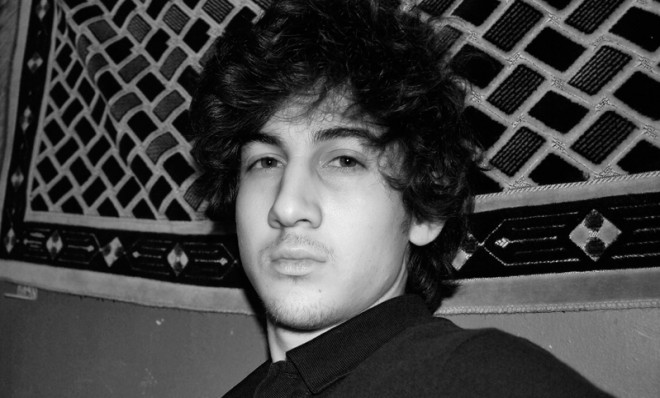Suspected Boston bomber Dzhokhar Tsarnaev will be tried in federal court
As a U.S. citizen, he will not be tried as an enemy combatant. But he still potentially faces the death penalty


A free daily email with the biggest news stories of the day – and the best features from TheWeek.com
You are now subscribed
Your newsletter sign-up was successful
Surviving Boston Marathon bombing suspect Dzhokhar Tsarnaev was formally charged Monday with using and conspiring to use a "weapon of mass destruction" in connection with last week's attack that killed three and injured more than 170 others.
The U.S. attorney's office in Boston announced the charges Monday afternoon, saying that a magistrate judge had read them to Tsarnaev as he lay in a Boston hospital bed. Tsarnaev, who is recovering from injuries sustained in a day-long manhunt with police, will be tried in federal court and not, as some had suggested, as an enemy combatant.
"Although our investigation is ongoing, today's charges bring a successful end to a tragic week for the city of Boston and for our country," Attorney General Eric Holder said in a statement. "We've once again shown that those who target innocent Americans and attempt to terrorize our cities will not escape from justice. We will hold those who are responsible for these heinous acts accountable to the fullest extent of the law."
The Week
Escape your echo chamber. Get the facts behind the news, plus analysis from multiple perspectives.

Sign up for The Week's Free Newsletters
From our morning news briefing to a weekly Good News Newsletter, get the best of The Week delivered directly to your inbox.
From our morning news briefing to a weekly Good News Newsletter, get the best of The Week delivered directly to your inbox.
If convicted, Tsarnaev could face life in prison or the death penalty. Massachusetts effectively banned capital punishment 30 years ago. But with Tsarnaev being tried at the federal level, prosecutors could still seek the death penalty in his case.
An affidavit submitted along with the complaint suggests investigators already have a bevy of evidence culled from hours of surveillance footage. Multiple cameras caught Tsarnaev and his older brother, Tamerlan, walking through the marathon crowd with backpacks believed to have contained pressure cooker bombs packed with shrapnel. (Read more about pressure cooker bombs here.) According to the affidavit, the younger Tsarnaev is seen on camera depositing his backpack at the site of the second explosion, fidgeting with his phone, and then taking off just before detonation.
From the affidavit:
"[Tsarnaev] glances to the east and then calmly but rapidly begins moving to the west, away from the direction of the finish line. He walks away without his knapsack, having left it on the ground where he had been standing. Approximately 10 seconds later, an explosion occurs in the location where Bomber Two [Tsarnaev] had placed his knapsack."
The affidavit notes that investigators recovered an unspecified "large pyrotechnic" from Tsarnaev's dorm room at the University of Massachusetts Dartmouth, as well as a hat that appears to match the one worn by one of the suspected bombers in the surveillance tape.
A free daily email with the biggest news stories of the day – and the best features from TheWeek.com
Tsarnaev is charged with "unlawfully using and conspiring to use a weapon of mass destruction" and with "maliciously damaging and destroying" property with an explosive device. The complaint invokes interstate commerce — it claims the marathon has a "substantial" economic impact of tens of millions of dollars — to place it under the federal government's purview.
Over the weekend, several prominent Republicans, among them Sen. Lindsey Graham (R-S.C.) and Sen. John McCain (R-Ariz.), called for the government to hold Tsarnaev as an "enemy combatant," which would have deprived him of some Constitutional rights and given the government more leeway in interrogating him. Investigators already invoked the public safety exemption to delay Mirandizing Tsarnaev while they sought information on any remaining explosives that may have existed.
However, on Monday, White House spokesman Jay Carney rebuffed those calls to try Tsarnaev as an enemy combatant, saying that because Tsarnaev is an American citizen, the government could not try him that way even if they wanted to. To do that, they'd need to first find a strong tie between Tsarnaev and a specific foreign enemy.
Here's Ari Melber explaining for Reuters why that "enemy combatant" workaround doesn't really apply here:
The short answer is no [he can't be tried as an enemy combatant] — unless evidence emerges that tangibly links the suspect to enemy forces, like al Qaeda, that are listed in the September 11, 2001 authorization of force. This is the main source of the administration's war powers, and courts have only applied the enemy combatant authority to potential defendants who are in or 'substantially' backing al Qaeda, the Taliban or other related forces…
But the Obama administration can't just brand any suspect an enemy combatant. It must use the legal criteria. And based on the available information, Tsarnaev probably does not qualify. [Reuters]
Pointing to past cases in which the government tried terrorists in federal court, Carney said, "The system has repeatedly proven that it can successfully handle the threat that we continue to face."
Jon Terbush is an associate editor at TheWeek.com covering politics, sports, and other things he finds interesting. He has previously written for Talking Points Memo, Raw Story, and Business Insider.
-
 How the FCC’s ‘equal time’ rule works
How the FCC’s ‘equal time’ rule worksIn the Spotlight The law is at the heart of the Colbert-CBS conflict
-
 What is the endgame in the DHS shutdown?
What is the endgame in the DHS shutdown?Today’s Big Question Democrats want to rein in ICE’s immigration crackdown
-
 ‘Poor time management isn’t just an inconvenience’
‘Poor time management isn’t just an inconvenience’Instant Opinion Opinion, comment and editorials of the day
